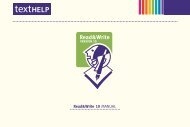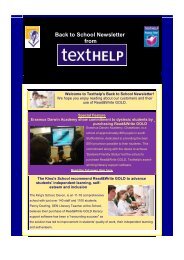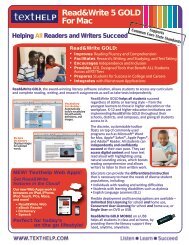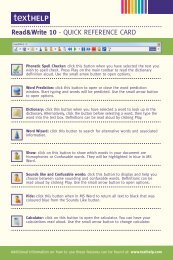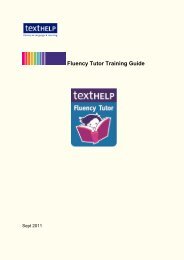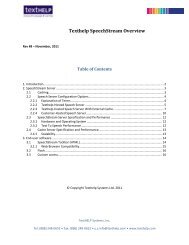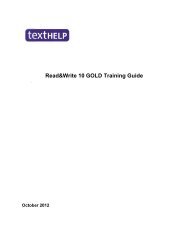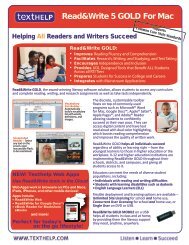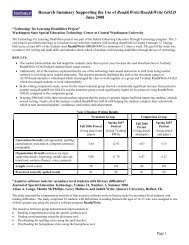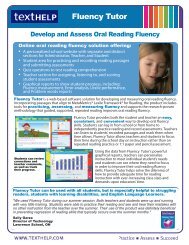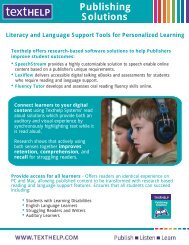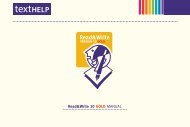01 NRDC Dyslexia 1-88 update - Texthelp
01 NRDC Dyslexia 1-88 update - Texthelp
01 NRDC Dyslexia 1-88 update - Texthelp
Create successful ePaper yourself
Turn your PDF publications into a flip-book with our unique Google optimized e-Paper software.
Developmental dyslexia in adults: a research review 157<br />
Appendix 6<br />
An analysis of referral items in dyslexia<br />
screening checklists<br />
Note 1 The diversity of these items challenges the claim of specificity.<br />
Note 2 More than one item in this list indicates a need to resolve the ambiguity between<br />
concepts and percepts.<br />
Function Checklist item Observations<br />
Auditory perception<br />
Hears sounds, words, or<br />
sentences imperfectly or<br />
incorrectly (28)<br />
A difficulty in auditory perception might<br />
have a distal explanation in either<br />
childhood glue ear (otitis media with<br />
effusion) or later impairment through<br />
injury of some kind. On the other hand,<br />
there might be a cognitive difficulty<br />
because of impaired processing speed.<br />
Visual perception<br />
Finds that words jump around on<br />
the page (50)<br />
Might indicate a problem with either<br />
low-level oculomotor factors (such as<br />
unstable vergence) or higher-level<br />
cognitive processes.<br />
Finds vision blurred when trying<br />
to look at fine details (51)<br />
Might indicate a need to wear<br />
spectacles.<br />
Phonological<br />
processing<br />
Finds it difficult to separate the<br />
syllables of a word (45)<br />
Might be a conceptual or a perceptual<br />
problem.<br />
Finds it difficult to understand<br />
spoonerisms (46)<br />
Might be a conceptual or a perceptual<br />
problem. Production of spoonerisms<br />
also involves verbal working memory.<br />
Finds it difficult to understand<br />
malapropisms (47)<br />
Might be a conceptual or a perceptual<br />
problem.<br />
Finds it difficult to understand<br />
rhyming slang (48)<br />
Might be a conceptual or a perceptual<br />
problem.<br />
Reading/ decoding<br />
Has difficulty in reading the<br />
newspaper, following small print<br />
and/or following columns (14)<br />
Difficulty with small print might indicate<br />
a need to wear spectacles. Difficulty in<br />
following columns might indicate a<br />
need to improve oculomotor control.<br />
Otherwise, difficulty in reading the<br />
newspaper might indicate a problem<br />
with decoding, a problem with general<br />
or vocabulary knowledge, or a problem<br />
with syntax.<br />
Has trouble reading addresses<br />
(21)<br />
If the addresses are handwritten, this<br />
could represent a need to become more<br />
familiar with handwriting, in addition to<br />
any problems with word recognition or<br />
decoding.



